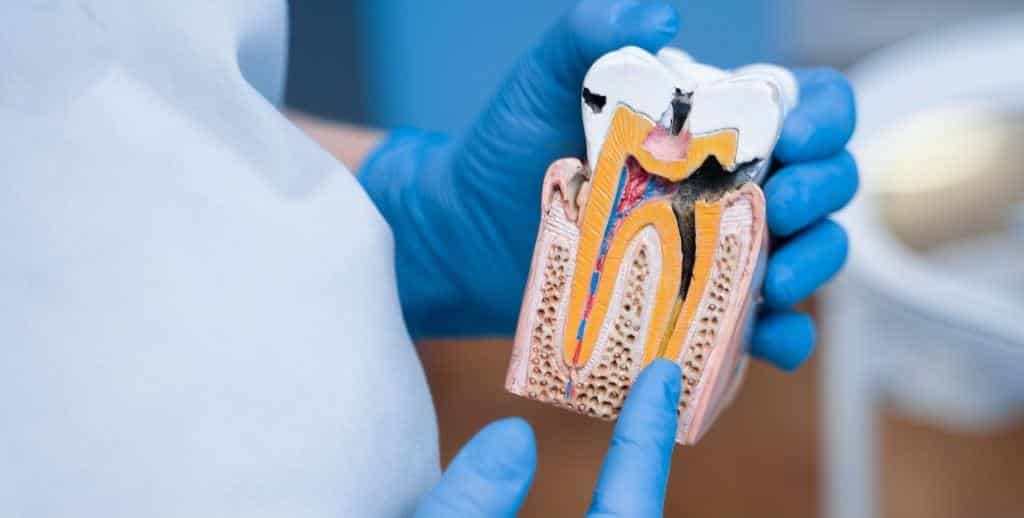Toothache is one of the most annoying complaints which make everyday life difficult. It is caused by various factors: decay, hypersensitivity or mechanical damage. Regardless of the cause, if left untreated, it can lead to very serious complications.
Often, we tend to underestimate it and instead of visiting the dentist, we go to the pharmacy once again. Unfortunately, in this way we only postpone the inevitable, and additionally we can severely damage ourselves! It is not uncommon for such moves to result from ignorance. Therefore, from this article you will learn what types and what can cause a toothache, as well as how to treat it.
And you can find out what the consequences of untreated toothache can be in our article "Decayed teeth a danger to the health of the whole body” .
Toothache - types
However, let us start by identifying the types of toothache. Why is it important to know them? The reason is simple. If you can pinpoint it, your dentist will be able to determine the cause more quickly and thus - start effective treatment right away.
We divide toothache into on:
- sudden, sharp
- pulsating, throbbing
- intense and constant
- chronic
- exacerbated by lying down
It is not uncommon for the pain to be accompanied by swelling or to radiate throughout the jaw or even the sinuses. To get rid of it quickly and effectively, it is worth knowing the causes - and then finding out how to prevent them.

Toothache - causes
So what causes toothache? The most common causes can include:
- cavities
- hypersensitivity (read more on this topic here)
- caries
- abscess
- grinding of teeth
- mechanical defects
- inflammations and infections (e.g. pulpitis, inflammation of the tissues around the tooth).
It is important to emphasise that any type of pain is a clear sign that something is wrong with your tooth. The sooner you react, the better your chances of short treatment or fewer complications (or lack thereof).
And what can you do if you are experiencing tooth pain but have the means to go to the dentist straight away? If this is the case, you can help yourself with the pain on an ad hoc basis using various remedies. IMPORTANT: Do not replace a visit to the dentist with these!

How to treat toothache?
We wrote about home remedies for toothache in our article of the same title "Home remedies for toothache". There you will find information about the most effective painkillers that are in almost every medicine cabinet. But not only - you will also learn about ways to manage pain without pharmaceuticals.
And what treatment can you expect already in the office with a specialist?
- If cavities are the cause of your pain, you can expect them to be filled.
- At hypersensitivity Your doctor will recommend fluoride gel or rinses.
- With caries, one option is bactericidal ozone treatment - but sometimes a filling is necessary.
- A tooth abscess can be dealt with by the dentist by cleaning the area around it and making a drainage.
- Teeth grinding is a more complicated matter - here, the cause needs to be accurately diagnosed (one of which could be stress, for example) and the next steps planned.
- With inflammation, treatment has to be adjusted accordingly - pulp removal, root canal treatment - sometimes unfortunately the tooth should be removed. But fear not - in our clinic we always make every effort to ensure that such treatment is a last resort!
For the time you have a toothache, limit the consumption of spicy foods, sweet drinks and also those that are hot or very cold.
As you probably know, it is best not to lead to pain. Correct hygiene, significantly limiting sugar, not smoking and not exposing the teeth to damage are half the battle - the other half is regular visits to the dentist. This is not only an opportunity to check the state of the mouth, but also for hygienization. You can read more about what this treatment, or rather treatments, looks like and why they are so important in our article "Dental hygiene in the UK - scaling, tooth sandblasting, polishing and fluoridation".
How often should they take place? The most common answer is 6 monthsHowever, it is your specialist who should tell you the optimum time frame.
Are you wondering about anything else? Contact us - we will be happy to dispel any doubts.

